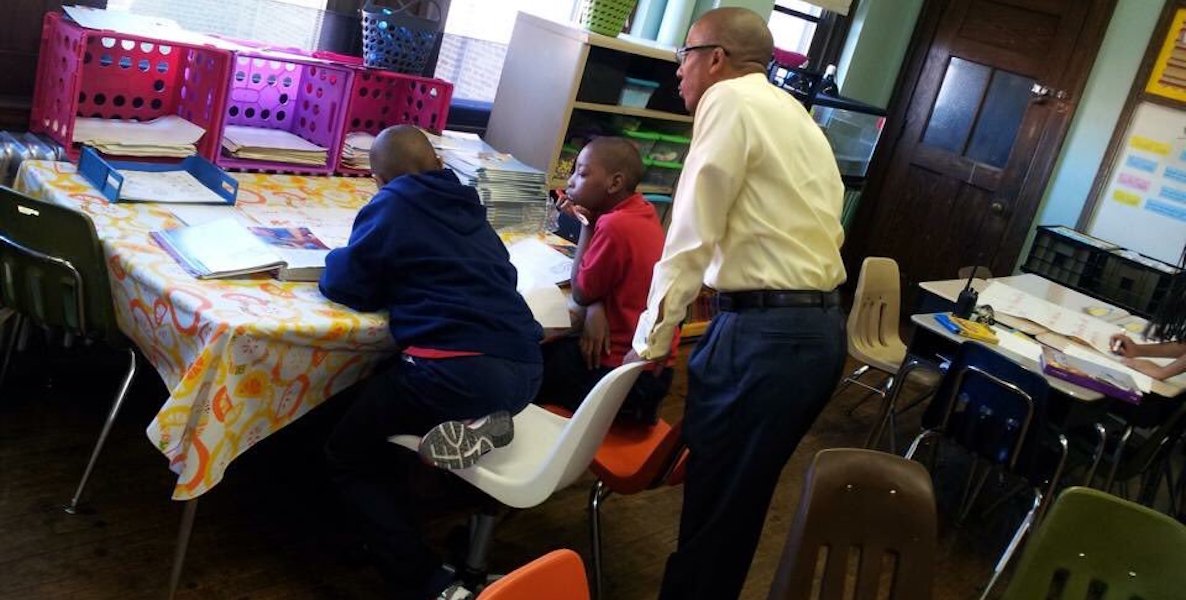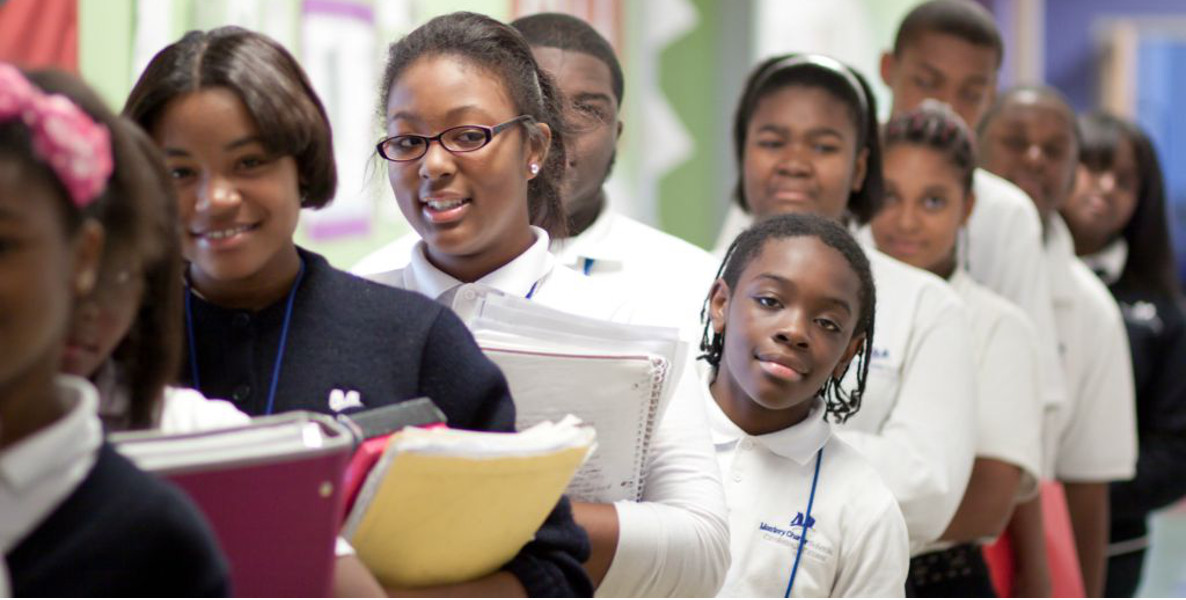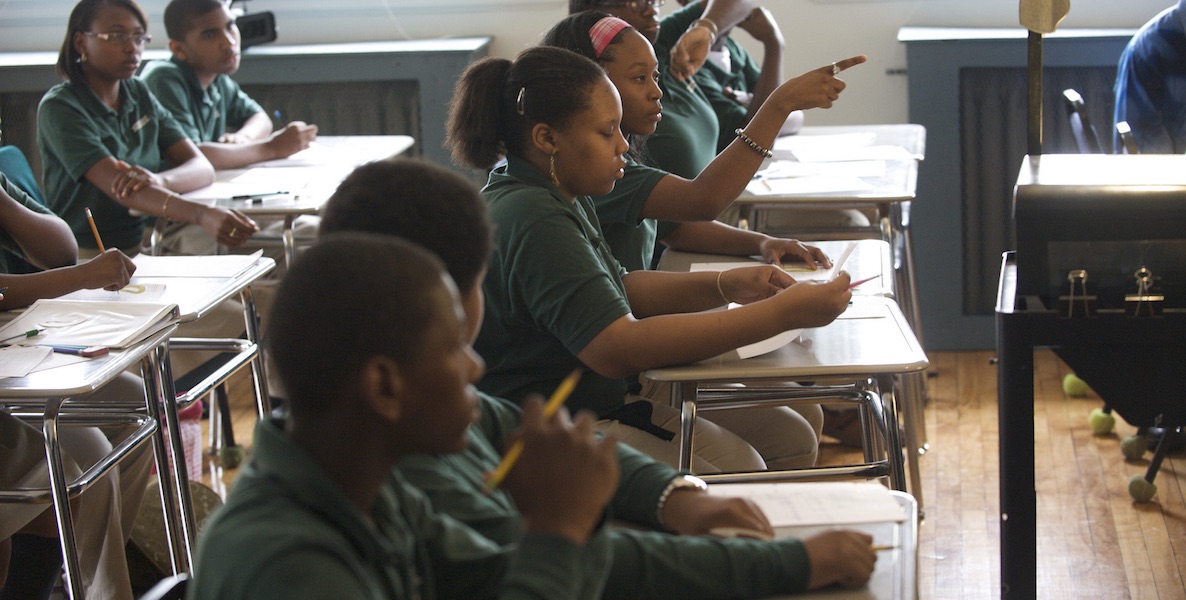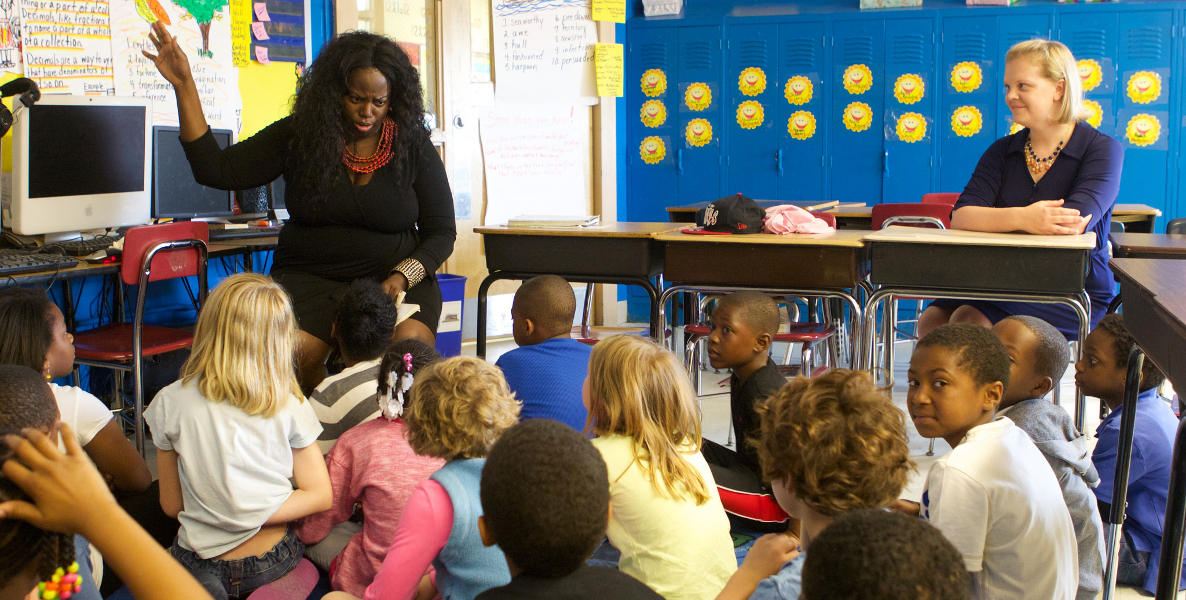“After 30 years of doing such work, I have concluded that classroom teaching…is perhaps the most complex, most challenging, and most demanding, subtle, nuanced, and frightening activity that our species has ever invented. The only time a physician could possibly encounter a situation of comparable complexity would be in the emergency room of a hospital during or after a natural disaster.” —Lee Shulman, Educational Psychologist.

This is one of my favorite quotes. It pushes me to think of the quality of teacher that we must hire, coach, and support. It informs how we prepare our teachers for the classroom.
The vast majority of new teachers struggle; however, they should still enter the classroom with a basic understanding of who and what they will teach. That includes considering the cultural context of your students, trauma’s impact on learning and restorative practices. Schools should expect to coach, onboard and assign mentors to new teachers. But there should also be a minimum that we expect all teachers to leave their programs with. Currently, we’re a long way from that.
The National Center for Teacher Quality (NCTQ) recently published an evaluation of 875 traditional undergraduate elementary teacher prep programs. The evaluation covers three main components:
- Admissions: how selective the program is in admitting candidates.
- Knowledge: what these teacher candidates are being taught.
- Practice: the quality of the practical experience the teachers in training receive.
Although this study provides evidence that things are improving, as usual, improvement is not fast enough. In real numbers, schools spend between 25 to 60 percent of their time trying to find the best talent possible for their teams. Despite that time, many schools will not find the quality they need.
This is not a new problem. As early as 1986, the Holmes Group—a group of education school deans—produced a report that attributed a lot of the blame for struggling schools on the training teachers were receiving in college. Since then others, most notably, Arthur Levine, the former president of Columbia Teachers College, have echoed their call for change. The fact that there has been only slight improvement, 20 years later, is a long-term failure with long-term consequences for our children.
Once students are in teaching programs, there is a lot that they simply aren’t taught, even though districts and schools will require them to teach those ignored subjects to children.
Universities often balk at the idea of being held accountable for how their graduates perform. This is ridiculous. Our local universities all have education schools that graduate dozens of new teachers a year. They have an opportunity to help shape the future for thousands of public school students in their own backyard. If those graduates are not prepared to teach, then the colleges are not doing their jobs.
For example, only 39 percent of the elementary programs in this study taught their undergraduates all five components of reading (phonics, phonemic awareness, fluency, comprehension, and vocabulary). Out of everything we are accountable to teach students, reading is by far the most complex. When students enter school with gaps in reading skills, the quest for literacy is even more fraught with challenges. Research indicates, students proficient at reading will have seen an average of 18,681 words of running text by the end of the first grade. Struggling students will have seen around half of that number. When students leave elementary school behind grade-level reading, the gap is compounded, and by high school, the chasm is vast.
Sixty percent of teacher programs are only teaching a part of what constitutes reading. From the start, these teachers are behind. When we put them in front of kids who are already behind, it spells disaster.
Consider the city’s big push for literacy, Read by 4th, in which the city and school district are aiming for every 4th grader to read at grade level. How can that be possible with instructors who don’t know how to teach reading? President Obama’s My Brother’s Keeper (MBK) initiative also has a goal of male students of color reading on grade level by the 3rd grade. How can we expect to meet these literacy goals if those who are charged with teaching—or remediating—literacy aren’t properly trained?
The study also found that only 13 percent of these teacher prep programs prepare their students in the level of math necessary to teach children conceptual math—a vital skill beyond basic procedures that so many of our elementary school students are taught.
And, only 5 percent of the programs hold the expectation that their training includes science, history, literature and composition. This is a huge red flag as many schools in Philadelphia and elsewhere require their teachers to teach all four core content subjects.
After all the training (or lack thereof) teachers receive, most candidates are assigned a school to complete their student teaching. Despite it being a way to apply all that was learned, from this research, and my experiences, it is hardly an experience that colleges look at as significant. In fact, the NCTQ report found that only 5 percent of teacher colleges have a quality student teaching element, and only 42 percent give proper feedback in areas of classroom management. Student teaching, what should serve as one of the most important aspects of any teaching certification program, is woefully poorly executed. (To see how Pennsylvania compares to the rest of the country see here.)

Get More From Every Story
We include boxes in nearly every story to help you take action. Click the boxes below to see how you can make Philly better.
Many teacher colleges, including local universities, simply do not put enough emphasis on the student teaching experience. Theory is always important, but it must undergird the actual work. To not provide feedback to student teachers, to not set explicit goals, to not value and incorporate cooperating teacher, and even to disregard the quality of the cooperating teacher is to undervalue the importance of student teaching. Poor student teaching programming can lead to adverse impact on students’ achievement levels-at the college and elementary/secondary school levels.
It is always amazing to me that certain groups routinely shun accountability. They don’t want principals and teachers held accountable for student performance. They reject schools and districts from being held accountable, and, more recently, they decried the U.S. Department of Education’s recommendations for states to be more involved in teacher certification programs that are rated as at risk or low performing.
As much as traditionalists criticize districts for hiring Teach For America (TFA), there is no way that first-year TFA teachers compared to teacher college graduates should have even close to similar results during their first year of teaching—but, often, they do. In a recent study, there was evidence that, generally, TFA teachers are not outperformed by traditionally prepared teachers. That is great news for TFA, but an alarming indictment on schools that claim to effectively prepare teachers in four years.
People also love to cite Finland’s minimal testing. For them, the panacea for improving schools is to limit accountability through assessments. However, what’s not talked about is how Finland, like other high-performing nations, built a significant amount of their accountability into the teacher selection process. Anti-testing folks like to ignore the process for acquiring the quality of the teachers that make it into Finland’s schools—only candidates from the top quartile are accepted into their teaching programs. (This doesn’t even consider the fact that in Finland, being a teacher is a highly-paid, highly-respected profession, attracting some of the best candidates in the country.)
In contrast, only 44 percent of schools in NCTQ’s study ensure that most of their teachers-in-training are amongst the top half of graduating college students. Pennsylvania mandates that students entering graduate teaching programs must have a 3.0 G.P.A. in undergrad, or a 2.8 with high standardized test scores. But it also allows for up to 10 percent admission for applicants who don’t meet the requirements.
This is no accident. A few years ago, the National Center for Education Statistics found that the 178,564 master’s degrees in education awarded across the country accounted for 27 percent of all master’s degrees granted. In other words, teacher training is big business. And it’s one that is growing, as our colleges send ever more would-be teachers out into our schools.
Sixty percent of teacher programs are only teaching a part of what constitutes reading. From the start, these teachers are behind. When we put them in front of kids who are already behind, it spells disaster.
It should be noted that this is a complex issue as many talented Black college students want to access teacher certification programs and may be barred because of the prevalence of poorly performing elementary-high schools in their communities. States and teacher colleges should keep an intense eye on diversity, while at the same time, support “minority” students in reaching a high bar in content and pedagogical expertise/practice.
Accountability for student success should not rest solely on our K-12 teachers and schools. Programs, like teacher prep, must also hold themselves accountable for transparency and an urgent sense of continuous improvement. By using the research provided by NCTQ, and the feedback that can be provided by practitioners at K-12 schools, they can help us all reach new heights.
We need all of our local teacher colleges to take a holistic view of their programming, in particular, how their graduates’ students are performing. Nearly 50 percent of new teachers quit their jobs within five years (some say this number is exaggerated). Often, this is because they are unprepared for the actual work that’s demanded of them once they get in front a classroom of students. Students not only need to know their subject deeply, they need to know how to teach students. Cultural context, racial biases, the impact of trauma, developing relationships are all necessary competencies to be an effective teacher.
Universities often balk at the idea of being held accountable for how their graduates perform—as they did in 2013, when the NCTQ released its first survey of ed schools. This is ridiculous. Our local universities, like Penn, Temple, Drexel and St. Joseph’s, all have education schools that graduate dozens of new teachers a year. They have an opportunity to help shape the future for thousands of public school students in their own backyard. If those graduates are not prepared to teach, then the colleges are not doing their jobs.
As a high school principal, I am keenly interested in our alumni’s performance in their post-secondary work. My team and I adjust our academic and social programming based on how our graduates perform outside of our walls. To shirk my own responsibility would call to question my commitment to our students and our community. Teacher colleges need to have the same perspective on their work. As a city, we are only as strong as our weakest schools and our lowest performing classrooms.
We know the complexity of teaching is like none other. Many things can be professionally developed, but there should be an expectation that our teacher colleges are raising the bar for what they provide to their students, setting these candidates up for success, and thus, setting our children up for success as well. Teacher colleges have a great opportunity to chart a different course and ensure their graduates can perform at the optimal levels when they enter our K-12 schools. Let’s see if they take it.
Sharif El-Mekki is the principal of Mastery Charter School–Shoemaker Campus, a neighborhood public charter school in Philadelphia that serves 750 students in grades 7-12. El-Mekki will be contributing regular columns from the school front lines this year.
Photo header: Flickr/US Department of Education





